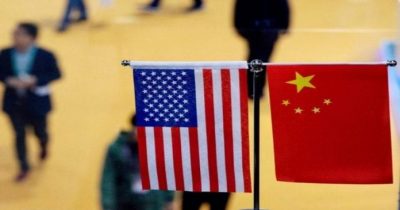“ChinaGate” in the Making: US Hostility Toward China Is Bipartisan

A key factor behind Trump regime hostility toward China is election year politics.
But what’s going on largely relates to China’s growing political, economic, industrial, technological, and military prominence on the world stage.
The US dominated the 20th century — notably post-WW II.
Yet for years, perhaps decades, especially post-9/11, it’s been a nation in decline because of its imperial arrogance, unipolar mentality in a multipolar world, endless wars by hot and other means against invented enemies, ruinous military spending at the expense of vital homeland needs, and unwillingness to change.
In contrast, other nations are rising, notably China, heading toward becoming the world’s leading economy in the years ahead.
Last century belonged to America, this one to China, why both right wings of the US one-party state are hellbent to marginalize, weaken, contain and isolate Beijing on the world stage.
US actions toward China and other nations on its target list for regime change show weakness and desperation — symptomatic of its decline, incrementally going the way of earlier empires.
It’s heading toward history’s dustbin because of its unacceptable actions against allies and adversaries alike — pressuring and bullying them for asserting their sovereign independent rights.
The US 116th Congress (January 2019 — January 2021) introduced numerous hostile to China measures, some passed, others pending, including the following:
- The Chinese Government COVID-19 Accountability Act
- Ensuring Chinese Debt Transparency Act of 2020
- Uyghur Human Rights Policy Act of 2019, a similar act introduced in 2020
- No CHINA Act
- Holding the Chinese Communist Party Accountable for Infecting Americans Act of 2020
- Hong Kong Autonomy Act
- Our Money in China Transparency Act
- End Chinese Communist Citizenship Act
- Preventing China from Exploiting COVID-19 Act
- Holding China Accountable Act
- Expressing the sense of the House of Representatives that the United States One-China Policy does not commit it to the…People’s Republic of China’s One-China Principle, and for other purposes
- Protecting Our Pharmaceutical Supply Chain from China Act of 2020
- Hong Kong Human Rights and Democracy Act of 2019
A concurrent resolution recognizing that Chinese telecommunications companies such as Huawei and ZTE pose…serious threats to the national security of the United States and its allies.
Recognizing Hong Kong’s bilateral relationship with the United States, condemning the People’s Republic of China…for violating their obligations to the people of Hong Kong, and supporting the people of Hong Kong’s right to freedom of assembly and peaceful protest.
(P)lac(ing) temporary restrictions on acquisitions by the People’s Republic of China, and for other purposes.
Protecting Our Pharmaceutical Supply Chain from China Act of 2020
Holding the Chinese Communist Party Accountable for Infecting Americans Act of 2020
Indo-Pacific Cooperation Act of 2019
Our Money in China Transparency Act
Along with the above measures, many others hostile to China were introduced in Congress, damaging bilateral relations, pushing them toward possible rupture by accident or design.
These actions are symptomatic of US hegemonic decline.
Time and again, US accusations against China are groundless.
Notably they include falsely blaming Beijing for made-in-the-US COVID-19, a likely bioweapon unleashed to try advancing Washington’s flagging hegemonic agenda.
It’s also about giving its corporate favorites a greater leg up on competition, along with continuing an unprecedented transfer of wealth from ordinary people to privileged interests.
US actions against China and other nations it doesn’t control unlawfully interfere in their internal affairs, an unacceptable UN Charter breach.
At the same time, they’re counterproductive over time, weakening the US, a key factor in its decline.
China is too important for the world community to go along with Washington’s hostile agenda.
Its leadership seeks cooperative relations with other nations, dominance over none — polar opposite how the US operates.
Last spring, an internal Chinese report warned that increasing US anti-China sentiment risks confrontation.
It called for Beijing to prepare for a possible worst-case scenario because of hardline US policies.
Beijing takes the threat seriously at a time when relations with the US are more fractious than any time over the past half century.
Bilateral differences are unrelated to trade. They’re all about China’s rising prominence at a time of US decline.
On Tuesday, China’s official People’s Daily broadsheet slammed Washington’s bipartisan Cold War mentality for “wielding (a) big stick…trying to obstruct (its) development,” adding:
Hegemonic USA “shamelessly” accused China of its own hegemonic aims and “power politics.”
The People’s Daily quoted US publication Vanity Fair, saying hostile to China remarks by Pompeo “diminished (his) credibility.”
Former US diplomat Daniel Russel called his unrelenting China bashing an “angry lament (and) extended ideological rant.”
Singapore scholar Kishore Mahbubani said China’s global prominence is growing because it doesn’t push to dominate other nations.
Earlier remarks by President Xi Jinping said “(n)o matter how much progress China has made in development, China will not threaten anyone else, attempt to overturn the existing international system, or seek spheres of influence.”
Trump’s “America first” mindset reflects hegemonic US aims.
Pressuring other countries to ally with its anti-China agenda, at the expense of their own interests, is self-defeating over time.
British scholar Martin Jacques described US actions as “hegemonic panic.”
The Trump regime’s aim to create an anti-China alliance is all about wanting to advance its own hegemonic aims at the expense of world peace, stability, and win-win mutual cooperation among nations.
So-called US-led Western values are all about trampling on the rights of other nations to control them.
*
Note to readers: please click the share buttons below. Forward this article to your email lists. Crosspost on your blog site, internet forums. etc.
Award-winning author Stephen Lendman lives in Chicago. He can be reached at [email protected]. He is a Research Associate of the Centre for Research on Globalization (CRG)
His new book as editor and contributor is titled “Flashpoint in Ukraine: US Drive for Hegemony Risks WW III.”
http://www.claritypress.com/LendmanIII.html
Visit his blog site at sjlendman.blogspot.com.
Featured image is from Global Village Space

